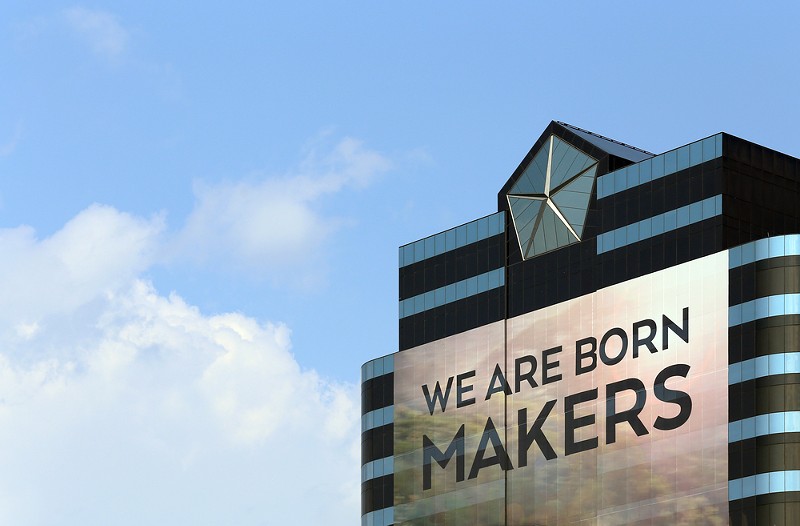'Guaranteed loser': State taxpayers give companies over $360K for 1 new Detroit job
[
{
"name": "GPT - Leaderboard - Inline - Content",
"component": "35519556",
"insertPoint": "5th",
"startingPoint": "3",
"requiredCountToDisplay": "3",
"maxInsertions": 100
}
]
Michigan taxpayers are handing some of the area's largest corporations between $68,000 and $361,000 to create one new job. In several cases, it's unclear whether companies will create any jobs in return for hundreds of millions of tax dollars.
Metro Times calculated the per-job cost to taxpayers for the Ford autonomous vehicle headquarters planned for Corktown's Michigan Central Depot; Little Caesars Arena and District Detroit; the east side Chrysler plant; and Dan Gilbert's four downtown projects.
Economists we spoke with said they calculate the per-job cost by dividing the value of a tax subsidy package for a project by the number of jobs a company alleges it will create. Only permanent jobs that are directly created by the company are included. The estimates are based off of figures provided by state and local officials, as well as the corporation receiving welfare.
Little Caesars Arena/District Detroit: $361,818 per job. The public is directly contributing $398 million, and the Ilitch organization promised 1,100 jobs. Those numbers could change if new businesses open in the District and the Ilitches receive more taxpayer money, as the family requested.
Ford train station renovation: $240 million for zero guaranteed new jobs. Ford is receiving a tax subsidy package worth $240 million and announced that it's creating 5,000 new jobs in Detroit. However, the company is only moving 2,500 jobs from its Dearborn campus, and says partner companies will move another 2,500 to the new campus. A Ford spokesperson tells Metro Times it's too early to know if Ford will create any new jobs at its new campus.
Dan Gilbert's four downtown Detroit projects: $88,285 per job. Gilbert is receiving $618 million in tax incentives and claims his projects will create 7,000 permanent new jobs. However, that's questionable. A Gilbert spokesperson dodged or didn't respond to questions about whether 7,000 new jobs will be created or 7,000 existing jobs will move into his four downtown buildings, on which construction is underway. Taxpayers may have paid $618 million for very few new permanent jobs.
Chrysler's east side plant: $68,686 per job. The public is contributing a tax and land package worth about $340 million and officials claim the project will create 4,950 permanent jobs.
Michigan and Detroit are hardly unique in overpaying for jobs — CNBC recently highlighted states that paid up to $6.4 million per job at data centers.
While the totals are startling, local officials claim the incentive packages are a good investment. But several economists who spoke with Metro Times say that's untrue, including Greg LeRoy, executive director at Good Jobs First, a nonprofit dedicated to "tracking subsidies [and] promoting accountability in economic development."
He said a project that demands as much as what we've seen in Detroit is a "guaranteed loser" in terms of the public recouping its investment.
"You have to start to worry when the subsidies get so high — five, six figures per job. At that point it's a very fair question to ask if taxpayers will ever break even," LeRoy says.
The formula with which LeRoy measures a project's payoff is simple: "For taxpayers to break even, the only numbers that matter are tax dollars out and tax dollars in."
"A lot of people want to do apples and oranges by comparing capital expenditures, ripple effect numbers, and that gets squishy ... we don't think that's right," he adds.
Michael LaFaive, senior director of fiscal policy with the Mackinac Center, a right-leaning think tank that tracks corporate welfare in Michigan, agrees. He called the per-job cost figures in Detroit "Foxconn-esque."
LaFaive notes there's little evidence to support claims that the type of incentives Michigan hands out are a good investment.
"Most literature from scholars with no dog in the fight in Michigan or Detroit will tell you that these [tax incentives] are not effective," LaFaive says, pointing to multiple studies that show the type of subsidies that Michigan regularly throws at developers are largely ineffective.
The 'squishy' numbers
State and local officials regularly use tax revenue figures that suggest using taxpayer money to fund new jobs is a sound investment. But those numbers are often exaggerated. We took a closer look at the math used in selling the $340 million subsidy package for the Chrysler plant that will cost taxpayers about $68,000 per job and found the city and state are estimating a much higher return than we will likely see.
In documents released to the public, the city claims the plant will yield a $342 million tax benefit to Detroit over 30 years. Mayor Mike Duggan's office and the Detroit Economic Growth Corporation's documents estimate $160 million of that will come in the form of "direct income tax." If employees earned $20 per hour — which UAW figures show is what a line worker with two to three years of experience will earn — and all lived in Detroit where the income tax rate is 2.5 percent, then the city would collect $5.8 million annually, or $154 million over 30 years.
However, many employees will not live in Detroit, and those who don't live in the city pay an income rate that's 50 percent lower, so the $154 million figure seems to be very generous.
The city is also estimating $133.3 million in income tax revenues that it claims will be created from spin-off jobs that it labels "indirect revenues." That means jobs created in Detroit at gas stations, restaurants, party stores, and similar businesses around the plant.
LeRoy says the factory may help create "upstream" jobs — parts suppliers and other companies that feed the factory. However, he adds, evidence shows that such projects create very few "downstream" jobs like those that the city is claiming will generate new city tax revenue.
The city also counts "estimated gross property taxes" at $28.5 million. But that's before a property tax abatement worth $12 million.
Still, some of that economic impact will be felt throughout the region and state. Strictly at the state level, employees earning $20 per hour would generate about $222 million in state income tax over 30 years. However, Chrysler collects income tax for the next 10 years, which lowers that figure to about $150 million.
In reality, it appears the public is paying $68,686 per job created at the Chrysler plant, and may not see much return on its investment over the next 30 years.
LeRoy says $68,000 is "a lot to expect for working-class wages."
"Ultimately, it's a large transfer of wealth from taxpayers to shareholders," he adds.
LaFaive echoes that.
"The fairness question to me keeps popping up — why are we indirectly or directly transferring billions of dollars from lots of Michigan taxpayers to a few higher income people?" he asks. "If you take a dollar out of my pocket to subsidize another, that's $1 less to spend on another business or infrastructure."
Stay on top of Detroit news and views. Sign up for our weekly issue newsletter delivered each Wednesday.







